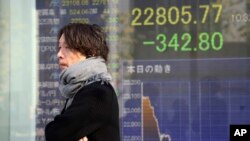ເສດຖະກິດຂອງໂລກແມ່ນມີຄວາມສ່ຽງທີ່ຈະຍັງຢູ່ໄລຍະການເຕີບໂຕຕ່ຳຕໍ່ໄປອີກ ຖ້າປະເທດຕ່າງໆບໍ່ເອົາມາດຕະການຢ່າງຮີບດ່ວນເພື່ອແກ້ໄຂບັນຫາຫຼາຍໆຢ່າງ ອີງຕາມຄຳເວົ້າ ຂອງອົງການການຮ່ວມມືທາງດ້ານເສດຖະກິດແລະການພັດທະນາ ຫຼື OECD ໃນວັນພະຫັດວານນີ້.
ໃນການຊັ່ງຊາປະຈຳໄຕມາດຂອງກ່ຽວກັບສະພາບເສດຖະກິດໂລກນັ້ນ ອົງການ OECD ທຳນາຍວ່າ ການເຕີບໂຕຈະບໍ່ເພີ້ມຂຶ້ນຢ່າງໄວວາແຕ່ຢ່າງໃດ ໃນປີໜ້ານີ້ ແລະຈະຢູ່ໃນລະດັບປານກາງ ໃນປີ 2021.
ຫົວໜ້ານັກເສດຖະສາດຂອງອົງການ OECD ທ່ານຣໍເຣັນ ບູນ ກ່າວໃນການຖະແຫຼງຂ່າວ ຢູ່ນະຄອນຫຼວງປາຣີວ່າ “ພວກເຮົາຄາດວ່າ ການເຕີບໂຕຈະມີຄວາມໝັ້ນຄົງ ໃນລະດັບຕ່ຳ ແຕ່ຄວາມຢ້ານກົວທີ່ສຳຄັນຂອງພວກເຮົາກໍຄືວ່າມັນຈະຢູ່ທີ່ນີ້ຕໍ່ໄປອີກ.”
ທ່ານບູນກ່າວວ່າ ຄວາມບໍ່ແນ່ນອນກ່ຽວກັບການເຕີບໂຕແມ່ນມາຈາກການເລີ້ມຕັ້ງກຳແພງການຄ້າເມື່ອໄວໆມານີ້ ການລົງທຶນບໍ່ພຽງພໍເພື່ອແກ້ໄຂບັນຫາກ່ຽວກັບການປ່ຽນແປງຂອງດິນຟ້າອາກາດ ແລະຜົນກະທົບຢ່າງແຮງຈາກການເຄື່ອນໄຫວທາງດ້ານການເມືອງ ເຊັ່ນເບຣັກຊິດເປັນຕົ້ນ.”
The world economy risks entering an extended period of low-growth if nations do not take urgent action to address myriad factors, the Organization for Economic Cooperation and Development said Thursday.
In its quarterly assessment of the global economy, the OECD predicts growth will not accelerate next year and only moderately in 2021.
“We project growth to stabilize at low levels, but our main fear is that it’s here to stay,” OECD chief economist Laurence Boone said at a Paris news conference.
Boone said the growing uncertainty stems from recently erected trade barriers, the lack of adequate investment to mitigate climate change, and high-impact political developments such as Brexit.
“What really concerns us is risks that have permanent effects — and that’s China’s slowdown, that’s the trade conflict, that’s the chronic lack of investment, all point toward slower growth for longer,” Boone said.
The OECD said the global economy already is growing at its slowest pace since the end of the financial crisis in 2008. It predicts a decade-low 2.9 percent growth rate this year and next, a reduction from the 3% rate it expected in September for 2020.
Boone applauded central banks for making timely monetary decisions that partially offset the damage inflicted by trade disputes, but she said governments have failed to invest enough to address climate change and improve infrastructure.
In a separate report released Thursday, the World Trade Organization said the Group of 20, which represents 19 of the world’s largest economies and the European Union, continued to place restrictions on imports during a six-month period ending in October. The restrictions affect goods valued at a total of more than $460 billion.
The U.S. and China are trying to negotiate an end to a protracted trade war. Observers envision a deal that boosts U.S. agricultural exports while curtailing tariffs America has placed on Chinese goods.
The OECD is a Paris-based organization that represents primarily developed nations across the globe.





